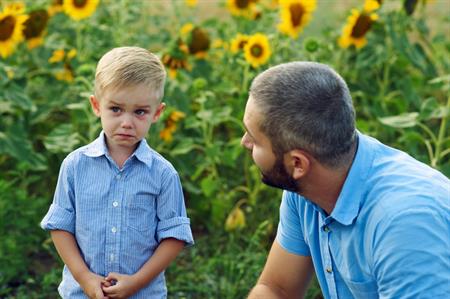
I wasn't born a good listener. In fact, when I started my training as a psychologist, I had to work hard to keep my own mouth shut so I could really hear what my clients were telling me. Often, the most important information came out camouflaged, between other comments. We all do that when we share our most vulnerable feelings.
Kids are no different. The feelings they're having a hard time with don't come out directly. They come out camouflaged as what we usually consider bad behavior. That tantrum my son had in front of the relatives at age three? He felt I had betrayed him by not listening to him, doing instead what made them comfortable. (He was right.) That time when my daughter was eleven and started screaming at me? She was all tangled up inside and trying to tell me about it, and I had been too distracted to listen.
If we're lucky, our kids give us a second chance to listen. Do they do this by politely saying "Mom, Dad, I know you're busy. I'm hoping we can schedule a few minutes for me to try again to tell you about this thing that's important to me."
Never! They give us a second chance to listen by losing it!
I know you don't want your child getting upset at you. But it's normal for kids to express their tangled-up feelings with off-track behavior, until they learn to maturely articulate their feelings. (How old were you when you learned to do that? Just asking. ❤️)
When you respond by shutting those feelings down -- yelling, punishing, giving a timeout, sending them to their room to "calm down," even demanding respect in that delicate moment -- what are you teaching your child?
That you're not listening. That your child won't get help from you to solve their problem. That they're on their own with those scary feelings.
If, instead, you can train yourself to remember that "bad" behavior is a red flag, you can Stop (what you're doing), Drop (your agenda, just until you regain calm and connection with your child), and Listen. Sure, you set limits on your child's behavior. But first, you listen.
This is so powerful because you:
1. Model self control and anger management.
Kids learn from what we do, not what we say.
2. Help your child feel heard, so they don't need to escalate.
Rage doesn't dissipate until it feels heard. When your child knows you're listening, they don't have to shout.
3. Strengthen your bond with your child
by showing up to help them when they need you the most.
4. Give your child the emotional tools they need
to minimize these kinds of upsets as they get older. When we stay calm, kids learn that feelings aren't dangerous. Yes, they may swamp us, but then they evaporate. When we listen and help our children to reflect on what's driving their experience, they become more mindful and able to self-regulate.
5. Earn your child's respect, so they're more likely to be respectful to you in the future.
Why not try it? Next time your child signals distress by raising her voice, just Stop. Drop everything else. Take a deep breath, and Listen, staying as calm as you can. Remind yourself not to take this personally. Try to see it from her perspective and empathize. Keep breathing as calmly as you can. (Noticing your breathing helps keep you calmer.)
Later, when everyone's calmed down, you'll find your child completely amenable when you make a gentle suggestion about the respectful tone you love to maintain in your house (or whatever other expectation you feel you need to set.)
By the time your child is a teen, he'll amaze others with his emotional stability. He'll even amaze you, by intervening in a nurturing voice to help you calm down when YOU lose it. In a teenager, that's what I call a miracle.
More listening + less shouting = Less drama, more Love.





